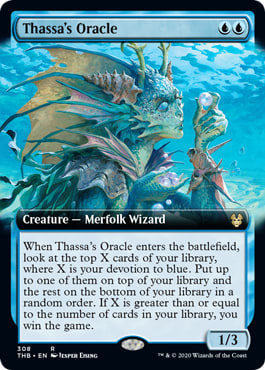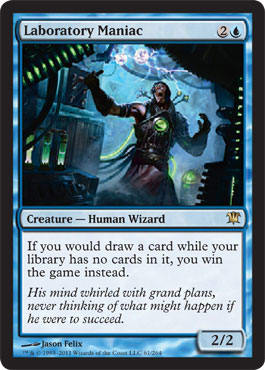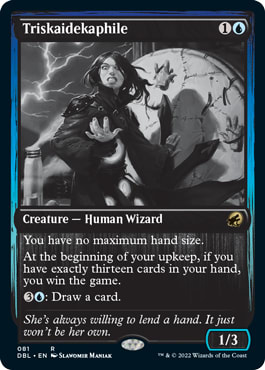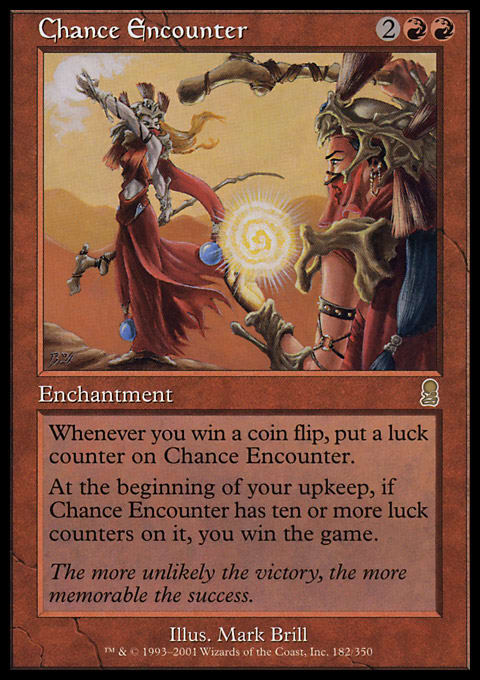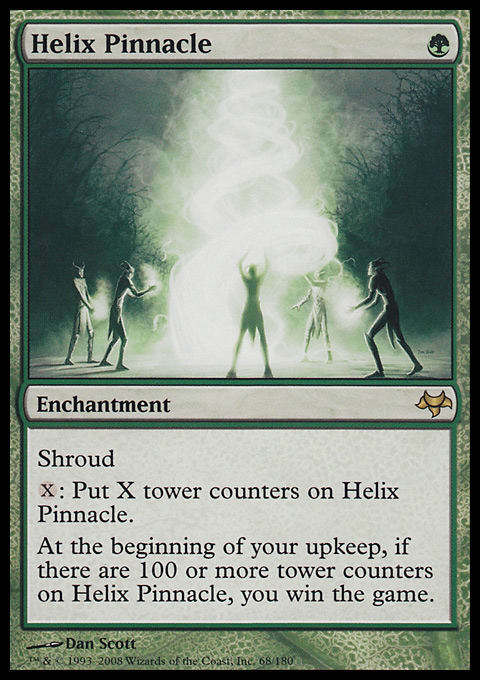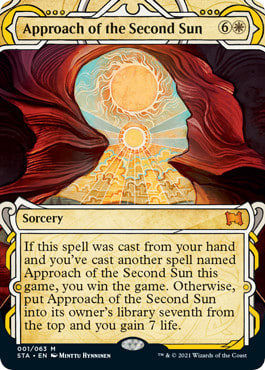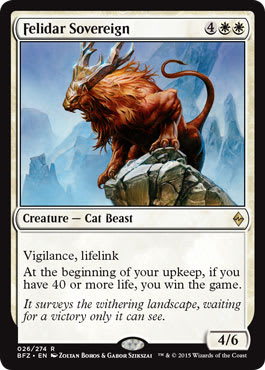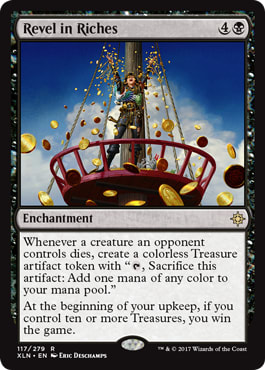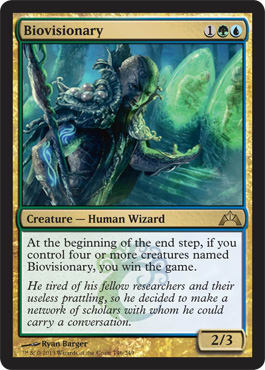Winning a game of Commander can sometimes become a long, grueling process. With three opponents with 40 life each, you have six times the life total to chew through than you would in a 20 life 1v1 format. Even considering the damage your opponents will deal to one another, that's still a lot of life for a single player to deal with. Conventional aggro decks have often struggled in the format, and this is a large part of the reason why. Many players who want to play aggressive strategies will focus on their commander instead, and aim to win via commander damage. Twenty-one damage is a lot less than forty, and the ability to ignore life gain is powerful in its own right.
Even for the decks that can't utilize commander damage, there are alternatives to winning conventionally. Infinite combos are a powerful and popular option, but they can often dominate more fair strategies, especially at a lower power level.
This column is about the cards that feature those four magic words:
"You win the game."
With a card that serves as an alternate win condition, you don't need to worry about what your opponents are doing. An opponent can have a life total that's best expressed in scientific notation, and it won't matter a bit. You don't need to worry about getting past blockers or pillow fort cards, or deciding who to kill first. It's simple one-and-done. Do your opponents have a way to counter, remove, or otherwise disable your wincon? If not, the game ends.
Today, I'll be covering my top ten alternate win condition cards for Commander.
My Top 10 Alternate Wincons
Because of the way these cards are designed, it's difficult to directly compare them in a meaningful way. For the most part, they're rewards for various niche strategies, and will struggle in a deck not built around them. The numbering of this list will be largely arbitrary, and heavily based on my personal preference. Versatility and power aren't the only factors, and nowhere is this more obvious than with my three honorable mentions.
Honorable Mentions
For a lot of people, these three cards are the first to come to mind when they think of alternate wincons, and it's easy to see why. Laboratory Maniac and Jace, Wielder of Mysteries both cause you to win the game if you draw from an empty library, rather than losing. This effect is strong and easy to conceptualize, but it also leaves you open to losing the game on the spot if one of your opponents can remove your Lab Man and you aren't able to protect it.
Thassa's Oracle is a bit more complex, but it boils down to the same idea - empty your library, win the game. In a format with cards like Hermit Druid, Tainted Pact, and Demonic Consultation, it's possible to use these cards to win on the very first turn of the game, with sufficient fast mana. Because of this, Laboratory Maniac and Thassa's Oracle are both heavily associated with cEDH, and are considered major parts of that metagame.
Jace sees much less cEDH play than his alternatives, and there are a number of reasons why. His mana cost is higher, and that cost is heavily weighted toward Blue, which makes him significantly more difficult for multicolored decks to cast consistently. This is problematic in cEDH, a format with an abundance of four and five color decks. Being a planeswalker is the last nail in Jace's coffin. Planeswalkers excel in slower and less aggressive formats, due to their slow generation of value and inherent vulnerability to creatures, and cEDH is the opposite of both those things.
10. Triskaidekaphile
Triskaidekaphile is all about hands. A 2-drop Blue creature, they remove your maximum hand size and can convert 4 mana into a drawn card. Neither of these abilities are amazing on their own, but they do an excellent job at supplementing the card's use as a win condition. If you have Triskaidekaphile in play and exactly thirteen cards in your hand at the beginning of your upkeep, you win the game. Because the trigger that wins you the game happens during your upkeep, your opponents will have a whole turn cycle to find an answer. You can use cards to protect your Triskaidekaphile, but that will make it more difficult to win the game. Thirteen cards really isn't that many, and with instant speed card draw, you can easily catch your opponents by surprise. This isn't an especially reliable wincon, but it's a decent one, and a perfectly serviceable card in its own right. Azure Mage may be an exceptionally mediocre card, but stapling a Spellbook and a win condition to it makes it pretty good.
9. Mechanized Production
For ages and ages, I've had a foil copy of this card sitting around, but I only recently got around to actually using it. Mechanized Production is a four-mana Blue aura. It enchants an artifact you control, and creates a token copy of that artifact at the beginning of your upkeep. Then, if you control eight or more artifacts with the same name as one another, you win the game. While that may have been difficult back when this card was first printed in Aether Revolt, it's only become easier with time. With the proliferation of treasure and clue tokens, the requirement for Mechanized Production is next to nothing. As good as this sounds, it does come with some drawbacks. As an aura, it's highly vulnerable to removal, and leaves you open to a 2-for-1. This is problematic for a card that doesn't do anything immediately, and is doubly so when that card is as flashy and exciting as this.
8. Chance Encounter
Chance Encounter is a card that's gone from mediocre to pretty impressive, purely by virtue of the cards that exist around it. When it was first printed in Odyssey, there were very few coin flip cards, and even fewer were any good. Since then, both the quality and quantity of coin flip cards have increased dramatically. With cards like Yursi, Fortune's Flame and Krark, the Thumbless in the format, winning ten coin flips to win the game on your upkeep has become a much better justification for a four mana enchantment that otherwise does nothing. Winning on your upkeep is something of a running theme, as you may have noticed. It's a way the designers ensure these cards don't cause too many problems, since it ensures your opponents have a chance to interact.
7. Helix Pinnacle
Helix Pinnacle might be one of the most iconic win conditions in Commander. A one mana enchantment with shroud, you can pay mana to put tower counters on it, and you win the game if you have a hundred tower counters on it during your upkeep. It's a reasonably effective mana sink, and shroud goes a long way to help protect your investment. However, if it does get removed by any means, the loss will be crippling. I said earlier that Chance Encounter is a four-mana enchantment that does nothing if it doesn't win you the game. By contrast, Helix Pinnacle can be analyzed as a one hundred and 1 mana enchantment that does nothing if it doesn't win you the game, and a lot of cards can end the game if you have over a hundred mana. While it's not exceptional, Helix Pinnacle remains a perfectly respectable way for a Green deck to bring the game to an end.
6. Halo Fountain
While it's far from the strongest win condition on this list, Halo Fountain is definitely the most versatile. It's a three mana White artifact with three tap abilities, each of which will require you to untap a number of your tapped creatures, as well as paying mana. The first costs one White mana and one untap, and creates a 1/1 token. The second requires two of each to draw a card. The third costs five White mana, and demands you untap fifteen tapped creatures. That's kind of a lot, but if it resolves, it'll win you the game on the spot. Halo Fountain is an excellent payoff for decks that go wide, especially ones that can tap their creatures for mana. Its first two abilities will come into play far more often, and make for an effective engine, but the third remains an omnipresent threat for as long as the card remains in play. Incidentally, I want to mention an obscure but powerful interaction that Halo Fountain has. If an effect makes it into a creature, you can both tap it and untap it to pay for one of its abilities. This makes it dramatically more powerful, allowing you to convert White mana to tokens at a 1-to-1 rate while also improving its card draw.
5. Approach of the Second Sun
Approach of the Second Sun is a card that reshapes the entire game around itself while leaving the board state untouched. The first time you resolve this seven mana sorcery, you gain seven life and put it into your library as the seventh card from the top. Not terribly impressive on its own, but everyone at the table knows what happens next. If you cast it from your hand and resolve it a second time, you win the game. Drawing seven cards might sound pretty difficult, but consider the fact that this format is one with Wheel of Fortune, Necropotence, and for some reason, Time Twister. It's really not that big of a roadblock. If you play Approach of the Second Sun, unless one of your opponents is already threatening to end the game, the entire table is going to be gunning for your head. As a win condition most non-Blue decks can't interact with, the only way most of your opponents can stop you is by murdering you before you can recast it, so be prepared to weather that storm. Approach of the Second Sun is an excellent option for control decks that are capable of drawing lots of cards and slowing the game to a crawl, but need ways to actually finish it. If inevitability is what you need, this card has that in spades.
4. Felidar Sovereign
I have a history with Felidar Sovereign. This creature was my White whale for a long time. An old friend of mine had an Oloro, Ageless Ascetic deck, and I can't even begin to guess how many games I had to lose to this card before I started playing more interaction to deal with it. A six-mana 4/6 creature with lifelink and vigilance, this creature has a remarkably simple effect. At the beginning of your upkeep, you win the game if you have forty or more life. In Commander, that's an incredibly low bar, and it leaves Felidar Sovereign perfectly poised to prey upon slower and more passive playgroups. If you haven't taken damage and you play this card on turn six, the game can end on the spot if an opponent doesn't have removal. While this exact scenario will pretty much never come up in a more competitive playgroup, it showcases this card's strengths quite well. It'll find itself most at home in decks with lifegain. Without that, even mild aggression can knock you below the forty life threshold. With proper support, however, Felidar Sovereign can serve as an excellent payoff for an archetype that can otherwise struggle to end the game.
3. Simic Ascendancy
Of all the mechanics in Magic, +1/+1 counters are one of the most supported. Between doubling effects, proliferate, and the countless number of commanders that put those counters on themselves or other creatures, few wincons can fit into as many decks as Simic Ascendancy. Alongside a simple three-mana activated ability that puts a +1/+1 counter on a creature, this two-mana enchantment has a pair of triggered abilities. When you put +1/+1 counters on your creatures, you can also put that many growth counters on Simic Ascendancy, and at the beginning of your upkeep, you win the game if it has at least twenty of them. Considering its low cost, broad usability, and functionality as a mana sink, this card is an excellent inclusion in a huge variety of decks.
2. Revel in Riches
When I think of a card that's only become more and more powerful with time, Revel in Riches is one of the first to come to mind. Make no mistake, it was always quite good. In a typical game of Commander, enemy creatures will die with at least some regularity. Creating treasures whenever that happens can be a remarkably powerful ramp effect, justifying a somewhat high cost of five mana. With that ability alone, Revel in Riches would already be playable, but that wouldn't put it on this list. If you've been paying attention, you'll know what I'm about to say next. If you control ten or more treasures and Revel in Riches at the beginning of your upkeep, you win the game. Reaching ten treasures with just this card is quite feasible, but quite slow, and that's exactly what this wincon was, back when it was first printed in Ixalan. Since then, however, the power level of cards that produce treasures has shot up immensely. In a world where Dockside Extortionist can create ten treasures single-handedly and commanders like Burakos, Party Leader and Dihada, Binder of Wills can contribute to your treasure count as well, Revel in Riches is significantly more dangerous.
1. Biovisionary
Biovisionary is a card that's near and dear to my heart. A humble three-mana 2/3 with no combat relevant abilities, they're not terribly impressive on the battlefield, but that doesn't mean much, does it? You don't need to attack with this creature, because at the beginning of your end step, you win the game if you control four creatures named Biovisionary. Your end step, not your upkeep. I cannot overstate how important this is. If it triggered on your upkeep, this ability would be kind of bad. Protecting four creatures for a turn cycle is a lot harder than protecting one. Because the ability triggers at the end of your turn, Biovisionary wins are much more abrupt than most of the other cards on this list, and they give your opponents less space to react. If you resolve a Rite of Replication, the game is straight up over. Your opponents don't even get the opportunity to use sorcery speed removal or the chance to topdeck an answer. You're just done. Biovisionary isn't the best card on this list, or the most versatile, but it's one I have the most memories of. I fondly remember brewing a terrible 60 card Biovisionary deck when I was a much newer player. One of these days, I really should build a deck that I can fit this card into.
Today is not that day, however, because we're reaching the end of this column. Alternate win conditions are fun and unique cards, but it's important to use them in moderation. If you're winning every game with the same card, it doesn't matter if that card is Craterhoof Behemoth or Azor's Elocutors, your opponents will eventually get sick of it all the same. Repetition can quickly drain the novelty of these effects for both you and the rest of your playgroup. Think of these cards as like spices. Cinnamon on toast is delicious, but a big pile of it is just unpleasant. That's all for this week.
















